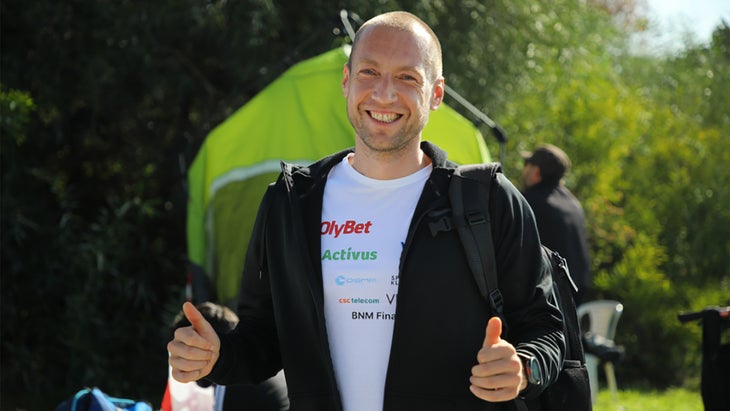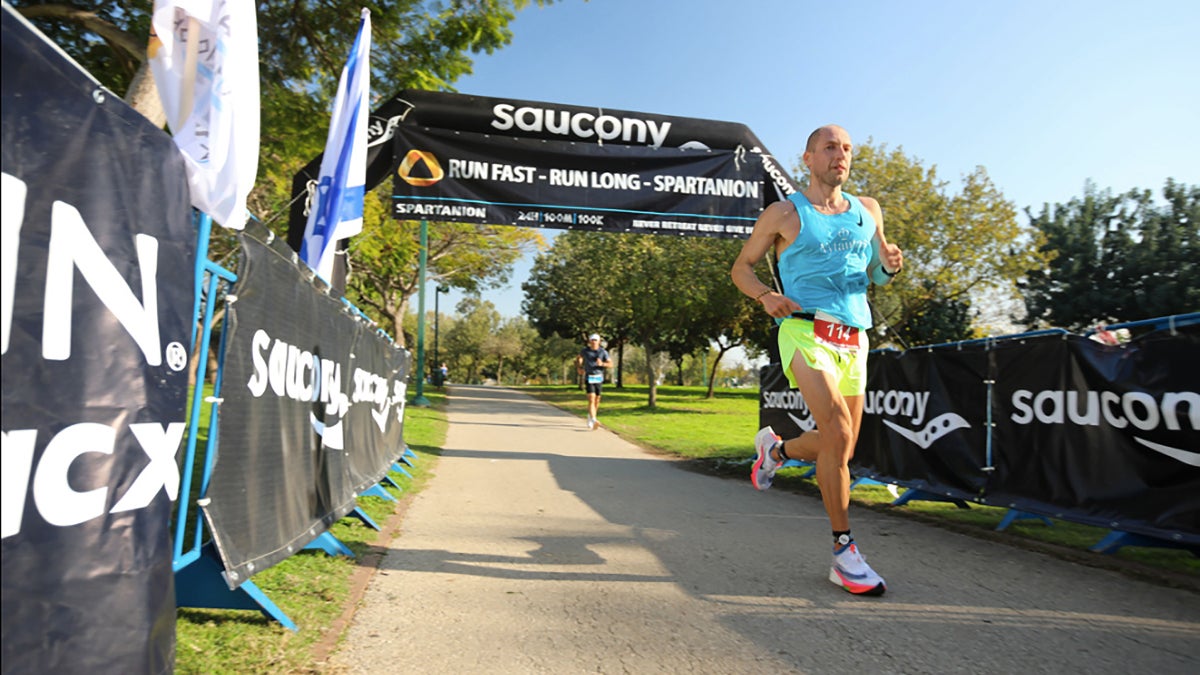No products in the cart.
Outdoor Adventure
How Aleksandr Sorokin Ran 100 Miles at a 6:31-Mile Pace
For exclusive access to all of our fitness, gear, adventure, and travel stories, plus discounts on trips, events, and gear,
sign up for Outside+ today.
Running a mile in six and a half minutes is a challenging benchmark, one that takes considerable fitness and a strong or even all-out effort for many. For some, a 6:30-minute mile is the target pace for a 5K. For far fewer, it’s the pace they can maintain for an entire marathon.
But on January 6, at the Spartanion 12-hour race in Tel Aviv, Israel, Lithuanian Aleksandr “Sania” Sorokin maintained a 6:31-minute pace for 100 miles, en route to shattering two of his own eye-popping ultradistance world records. His time of 10:51:39 smashed his standing 100-mile world record of 11:14:56, set last April. Sorokin’s performance also set the record for the greatest distance ever run in 12 hours—110.23 miles, besting his own previous world record of 105.82 miles (warranting a pace of 6:48), which he set at the same event in England last spring.
For the new record, Sorokin completed 122 laps on a 0.91-mile loop course. For the first 65 miles, Sorokin held a pace that ranged between 6:13 and 6:25 minutes per mile. He kept things up with a sub-6:55 pace as he reached the 100-mile split before eventually slowing to 7:10 and then 7:15 over the final miles, for a total average pace of 6:32. For perspective, Sorokin’s average pace equates to a 5K time of 20:18 and a marathon time of 2:51:10. But Sorokin ran the equivalent of 35 straight 5Ks, or more than four consecutive marathons.
Whereas mountain ultrarunning has grown exponentially in recent years, ultrarunning on repetitive loop courses is a niche discipline that doesn’t get much exposure outside of the 50K, 100K, and 24-hour International Association of Ultrarunners (IAU) world-championship events.
“I ran a bit faster than I thought I would for 100 miles,” Sorokin said on Sunday over a Zoom call. “When I started, I knew I had the capacity to run fast for 12 hours, but it still surprised me that I was able to run that fast.”

Every hour during the Spartanion, Sorokin drank a half-liter of fluids (a mix of water, electrolyte drinks, and Coke) and consumed about 400 calories from a variety of gels, chips, cookies, and candy. He wore Nike Zoom Alphafly Next% shoes during the race. And he said he’d been running about 185 miles per week during the three-month training block leading up to the event. That included a three-week high-altitude stint in Iten, Kenya, located an elevation of 7,900 feet.
“It’s a synergy between the physical and mental states of your body and your mind,” Sorokin said of the effort, citing the importance of both physical and mental preparation for ultradistance events.
Sorokin, 40, was a competitive kayaker when he was younger, but when his paddling career ended, alcohol, cigarettes, junk food, and weight gain followed. He began running in 2012 at the age of 31 to get back in shape. Now he’s one of the preeminent ultrarunners in the world. He was champion of the 2017 Spartanion—an event created as a qualifier for the famous 153-mile Spartathlon ultramarathon in Greece. He also won the 2019 IAU 24-hour world championship and holds the 24-hour world record for pounding out 192.25 miles last August, breaking the previous record of 188.59 miles set by legendary Greek runner Yiannis Kouros in 1997.
“His previous 11:14 effort last year [at the Spartanion] was a huge deal, but this absolutely destroys it,” says Nick Coury, who set the American record for 24 hours of running in December with 173.015 miles. “To make that big of an improvement, it just shows he’s just at another level.”
“You really have to condition yourself physically for that short, flat running,” says American ultrarunner Camille Herron, who holds numerous women’s ultrarunning world records and is the only woman to win all three IAU world-championship events. “And then mentally, it’s the same scenery lap after lap after lap. Maybe it’s a little more interesting than being on a treadmill, but you have to find a way to break it up mentally so you don’t go crazy.”
Before Sorokin’s record-setting tear that began last spring, American ultrarunner Zach Bitter held the 12-hour and 100-mile world records. “Yet another incredible performance and historic day for Sania Sorokin, becoming the first person to break 11 hours for 100 miles!” Bitter said on Twitter. “This sport gets wilder every day!”
Source link

